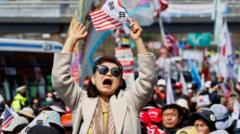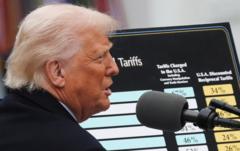**The decision follows weeks of protests and conflict surrounding the president's short-lived governance marked by a military intervention.**
**Impeached: South Korea's President Yoon Suk Yeol Removed by Constitutional Court**

**Impeached: South Korea's President Yoon Suk Yeol Removed by Constitutional Court**
**In a historic ruling, South Korea's Constitutional Court removes President Yoon Suk Yeol from office following his controversial martial law declaration.**
South Korea’s Constitutional Court made a pivotal ruling on Friday, confirming the impeachment of President Yoon Suk Yeol and marking his removal from the presidency four months after a contentious declaration of martial law. This announcement has ignited jubilant celebrations among demonstrators who have relentlessly called for Yoon's removal, voicing their dissent against his administration effectively on the streets of Seoul through harsh winter weather.
At 11 a.m. local time, Acting Chief Justice Moon Hyungbae proclaimed the court’s unanimous decision to oust Yoon, stating that the former president had “betrayed the trust of the people” due to severe legal violations. The ruling came after a period of intense public outcry and is immediate, unappealable, and marks a significant shift in South Korean governance.
Yoon's impeachment stemmed from a surprise declaration of martial law on December 3, which lasted only a brief six hours after lawmakers swiftly overturned it. The decree led to an unprecedented military presence within the National Assembly, provoking citizens to stand against armed troops sent to prevent lawmakers from conducting a critical vote. During the proceedings, several lawmakers even went to great lengths to bypass the military blockade, further highlighting the tension surrounding Yoon’s presidency.
Justice Moon clarified that Yoon's actions did not satisfy constitutional criteria for enacting martial law, contradicting his claims of a national crisis necessitating such extreme measures. The ruling paves the way for potential political changes in South Korea as it reflects a decisive moment in the nation's response to its leadership and democratic principles.
At 11 a.m. local time, Acting Chief Justice Moon Hyungbae proclaimed the court’s unanimous decision to oust Yoon, stating that the former president had “betrayed the trust of the people” due to severe legal violations. The ruling came after a period of intense public outcry and is immediate, unappealable, and marks a significant shift in South Korean governance.
Yoon's impeachment stemmed from a surprise declaration of martial law on December 3, which lasted only a brief six hours after lawmakers swiftly overturned it. The decree led to an unprecedented military presence within the National Assembly, provoking citizens to stand against armed troops sent to prevent lawmakers from conducting a critical vote. During the proceedings, several lawmakers even went to great lengths to bypass the military blockade, further highlighting the tension surrounding Yoon’s presidency.
Justice Moon clarified that Yoon's actions did not satisfy constitutional criteria for enacting martial law, contradicting his claims of a national crisis necessitating such extreme measures. The ruling paves the way for potential political changes in South Korea as it reflects a decisive moment in the nation's response to its leadership and democratic principles.



















